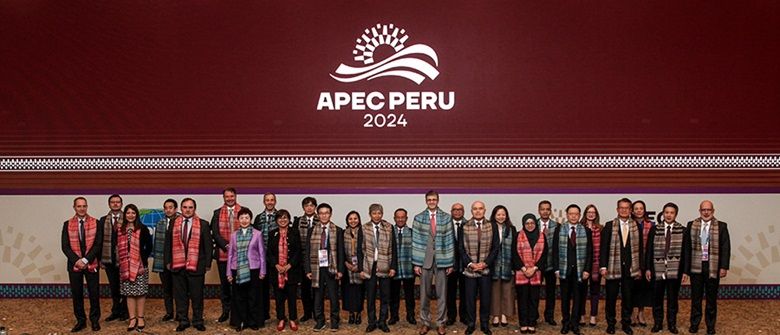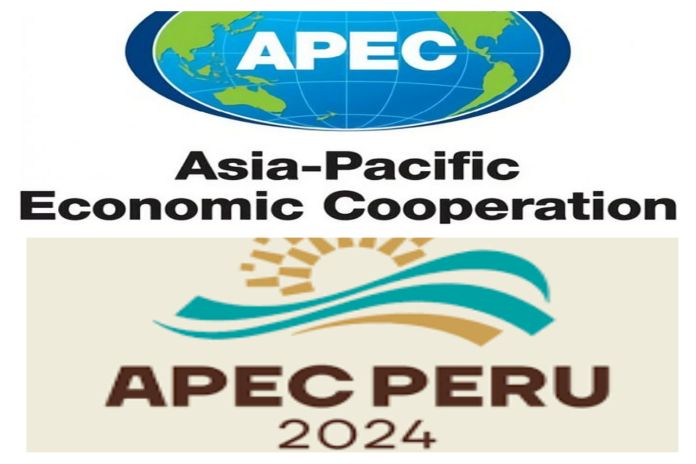– APEC Putrajaya Vision 2040, including through the implementation of the Aotearoa Plan of Action, and the Cebu Action Plan.
LIMA, Peru – The APEC finance ministers, convened the 31st meeting in Lima, Peru on 21 October 2024, chaired by José Arista Arbildo, minister of economy and finance of Peru, under the 2024 APEC Finance Ministers’ Process (FMP) theme, “Sustainable + Digital + Resilient = APEC”, and its priorities, envision and encourage an Asia-Pacific region that is more sustainable, more digital, more resilient and more APEC focused, and look towards the future of the FMP.
The APEC finance ministers also reaffirm strong commitment to the APEC Putrajaya Vision 2040, including through the implementation of the Aotearoa Plan of Action, and the Cebu Action Plan.
The 2024 APEC finance ministers’ meeting, joint statement reads:
Global and regional economy
“Despite the reduction of inflationary pressures and gradual easing of monetary policy, the medium-term outlook for global and regional economic growth remains uneven and weaker than prior to the pandemic. We also acknowledge that the likelihood of a soft landing for the global economy has increased and that we are on a path towards a gradual recovery of economic activity. However, risks, such as increased global debt challenges, the effects of high interest rates, geoeconomic tensions, disruptions in global value chains, volatility of commodity prices and extreme weather conditions due to climate change, remain.
We emphasize the need for a balanced mix of monetary, fiscal and other policies to address global and regional challenges, with strong multilateral cooperation in the APEC region as a critical driver for economic growth. This approach is essential for fostering an open, dynamic, resilient and peaceful Asia-Pacific community for the prosperity of all our people and future generations. Our policy efforts should emphasize leveraging our macroeconomic strengths, and prioritize policies that enhance growth and mitigate risks.
We recognize the importance of implementing responsible and prudent fiscal and monetary policies, while considering their potential spillover effects. We also acknowledge the relevance of effectively addressing debt vulnerabilities, including through the joint efforts by official and private borrowers and creditors to improve debt transparency. We also reaffirm our 2021 exchange rate commitments.
We recognize efforts to pursue complementary initiatives that support sustainable, inclusive and resilient growth, reduce poverty and seize opportunities, such as promoting sustainable finance objectives, fostering trade and investment, boosting innovation and digitalization, expanding access to quality education and decent work and promoting more competitive markets in all sectors, as well as the transition to the formal and global economy. In line with this, we reiterate the importance of continuing to work together to support a rules-based, non-discriminatory, fair, open, inclusive, equitable, sustainable, and transparent multilateral trading system, with the WTO at its core.
Consequently, in 2024, we strengthened our cooperation and contributed to the global and regional discussions by sharing best practices in areas of sustainable energy transitions, domestic carbon pricing and non-pricing measures, sustainable infrastructure financing, open finance, digital financial inclusion and hydrometeorological risk financing. These insights are critical to achieving sustainability, inclusiveness and resilience of economic development, in line with specific domestic circumstances.
More sustainable
We acknowledge the importance of developing an appropriate policy mix, which could consist of fiscal, market and regulatory mechanisms including, as appropriate, the use of domestic carbon pricing and non-pricing mechanisms, carbon markets and incentives, towards global net-zero greenhouse gas emissions/carbon neutrality by or around midcentury, while taking into account the latest scientific developments and in line with different domestic circumstances.
Therefore, we emphasize the need for appropriate and coordinated approaches to climate action, that leverage on a diverse set of policy instruments, tailored as necessary to specific domestic circumstances. We acknowledge the relevance of the involvement of and collaboration among stakeholders, including both public and private sectors, to address the climate challenges, and that distinctive approaches can foster investments and other key elements for sustainable transitions to serve as a tool to drive innovation and sustainability with effective and efficient outcomes.
To achieve clean, sustainable, just, affordable, and inclusive energy transitions, we highlight the need to adopt holistic strategies encompassing various dimensions to overcome the barriers that would inhibit sectors’ pathways. We recognize that each sector has its own set of challenges, and we also recognize the benefits of tailored approaches and solutions. Thus, we emphasize the importance of innovative financing mechanisms that take into account the specific needs of various sectors and the individual circumstances of each economy, such as blended finance.
We also emphasize the importance of enabling tools, such as taxonomies, sectoral roadmaps and sustainability information disclosure frameworks, and developing financial products and services to support clean, sustainable, just, affordable and inclusive transitions, as well as the crucial role of transition finance”. We recognize the importance of considering energy transition technologies and to promote the financing as appropriate of economic sectors. We recall our previous commitments to rationalize and phase out inefficient fossil fuel subsidies that encourage wasteful consumption, while recognizing the importance of providing those in need with essential energy services.
We acknowledge the importance of financing quality, reliable, sustainable and resilient infrastructure, including regional and transborder infrastructure projects, which should support sustainable and inclusive economic growth and human well-being, while also ensuring economic, financial, social and environmental (including climate resilience) sustainability. We emphasize the importance of cooperation can play a significant role in enabling infrastructure financing and remain committed to implementing the APEC Connectivity Blueprint (2015-2025).
This year, we noted APEC economies’ progress in integrating sustainability considerations into their infrastructure frameworks, as well as innovative financing mechanisms. Besides public sector financing, we underscore the need for scaling up private sector financing to bridge infrastructure gaps.
We launch the Sustainable Finance Initiative (Annex A) for the coordination and promotion of voluntary information sharing and capacity building on sustainable finance issues. This initiative will operate and sunset in 2027, unless it is renewed, in line with its terms of reference. We thank Peru for serving as the first convenor for the 2025-2027 period.

More digital
We recognize that the adoption of open finance schemes in our economies has the potential to enhance competition in financial markets, offer more personalized, affordable and accessible financial products and services to consumers, and foster financial inclusion by providing access to those who have been historically excluded from the financial system.
Moreover, we note that the development of these schemes can promote greater transparency and strengthen trust in financial services, but also brings about new risks and challenges that must be addressed. We encourage economies and stakeholders to make efforts to share best practices and standards, including in consumer protection area, that foster the development of competitive and responsible open finance ecosystems. Such approach could include both practices and standards that should mitigate risks, address the unique vulnerabilities faced by marginalized groups, prioritize consumer benefits, and ensure consumer confidence in data sharing within the APEC region.
We stress the importance of fully harnessing the power of digitalization for inclusive finance to reduce the digital divides between different economies and socio-economic groups. We acknowledge the crucial importance of digital financial education in building resilient, inclusive and sustainable economies. In a world where technology is constantly redefining the interaction between individuals, businesses and financial markets, we encourage economies to drive innovation, foster healthy competition, and promote digital financial education as a policy tool to support economic development.
We believe that, by equipping individuals with the knowledge and tools to navigate digital financial services while strengthening awareness about the privacy of data, informed consent, and the security measures implemented, we can foster confidence in the use of financial services, reduce potential harm, ensure inclusion, and support sustainable economic growth in our economies. It is critical to tailor these educational efforts to the specific needs of vulnerable and underserved populations to help close gaps in financial literacy and inclusion. In this regard, we recognize the importance of digital infrastructure and fostering cooperation to advance digital financial inclusion and financial literacy.
More resilient
In recent years, hydrometeorological events have increased in frequency, duration and magnitude due to climate change. We recognize the need to strengthen domestic financial protection, as best determined by each economy and according to its own circumstances, against such risks to support public finance sustainability. We emphasized the importance of addressing these risks due to the high social, fiscal and economic impacts potentially affecting critical sectors such as health, housing, infrastructure, agriculture, electricity, etc.
We note that enhancing resilience starts with better understanding of risks, disclosing them, and developing strategies to manage them. We recognize the relevance of improving the financial management of hydrometeorological risks, having reliable information to quantify the risks, and determining the best financing strategies. At the same time, we acknowledge the importance of preventive measures to reduce the vulnerability of the economies, including the development of resilient infrastructure, and early warning systems. We encourage the involvement of the private sector and international organizations to strengthen the financial management of these risks. In this regard, we emphasize the importance of disaster risk financing and insurance to mitigate and respond to present and future events.
More APEC
Considering the Cebu Action Plan comes to an end in 2025, we welcome the adoption of the guidance document for developing a new finance ministers’ process roadmap (Annex B), which will serve as a basis for the preparation of this document next year. We appreciate the support of the Policy Support Unit (PSU) with the preliminary review of the implementation of the Cebu Action Plan and the assessment of the potential considerations for the new voluntary and non-binding roadmap.
We recognize the strategy for modernization of the finance ministers’ process, adopted in Lima in 2016, is still relevant and important for FMP, and we endorse the second strategy for modernization of the finance ministers’ process (Annex C) to ensure that the FMP remains an agile, efficient and beneficial platform for all APEC economies.
We acknowledge and appreciate the efforts and progress of the Working Group on Regional Disaster Risk Financing and Insurance Solutions for APEC Economies (DRFI-WG), the Asia-Pacific Financial Forum (APFF), the Asia-Pacific Infrastructure Partnership (APIP), the Asia-Pacific Financial Inclusion Forum (APFIF), Asia Region Funds Passport (ARFP) and the APEC Finance and Development Program (AFDP).
We acknowledge the work done by and note the completion of the workstream on Financing a Just Energy Transition (FJET), created in 2022 within the framework of the “New Strategy for Implementation of the Cebu Action Plan”.
Other issues
We appreciate the continuous support from the Asian Development Bank, the Inter-American Development Bank, the International Monetary Fund, the Organisation for Economic Cooperation and Development (OECD) and the World Bank Group to the FMP’s work, as well as this year’s contributions from the Development Bank of Latin America and the Caribbean (CAF) and the UNDP.
We welcome the private sector’s active and ongoing collaboration to the finance ministers’ process, through the APEC Business Advisory Council (ABAC) and other private sector contributors, and acknowledge ABAC’s recommendations to Finance Ministers.
“We thank Peru for hosting the 2024 APEC FMP this year and we look forward to meeting again for our 32nd meeting in the Republic of Korea in 2025.”





